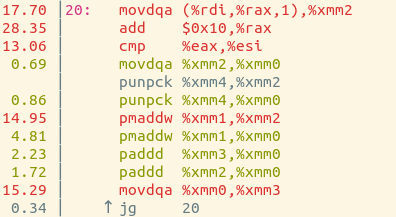So instead I used perf, which is a totally magical performance measurement tool for Linux. I needed to upgrade my kernel first, which was a bit nervewracking. But I did it! And it was beautiful. There are colours, and we got it to annotate the assembly code with performance statistics. Here’s what I ran to do it:
$ perf record ./bytesum_intrinsics The\ Newsroom\ S01E04.mp4 $ perf annotate --no-sourceAnd here’s the result:
The movdqa instructions have to do with accessing memory, and it spends 32% of its time on those instructions. So I think that means that it spends 32% of its time accessing RAM, and the other 68% of its time doing calculations. Super neat!
Tag: performance
PHPNG Dramatic Speedup Features Coming in PHP 6 Release
PHPNG Dramatic Speedup Features Coming in PHP 6 Release
Some highlights:
- The plot to kill Apache mod_php SAPI
- Type hinting for everything (function arguments, function return values, and variables)
- Asynchronous programming (using the new await keyword)
- Production ready standalone web server
- Multi-thread safe
Akamai vs Incapsula – Comparison Review
Application Delivery Controllers (ADCs) are the current evolution of old school CDNs platforms tasked with responsibility not only for website’s performance, but also for its security and availability. By singlehandedly covering these mission crucial aspects of content and application delivery these technologies allow you to replace multiple appliances with one full service solution. With that, ADCs help eliminate many integration related issues, while also dramatically cutting down all setup, acquisition and maintenance costs.
In the world of ADCs, Incapsula is perhaps the most promising up-and-comer, a cloud-based service that seems to have the technology and the business sense needed to position itself at the same level as its legacy competitors.
It’s been almost two years since I last blogged about Incapsula. Now with recent announcement of its load balancing and failover features, I decided to update my review by pitching Incapsula against Akamai – a globally recognized CDN industry leader, who is also making a leap into the world of full service application delivery.
For this “head to head” comparison of Akamai vs Incapsula, I’ll be focusing on security, performance, availability and – of course – price of service.
You can find the full comparison here but for those of you who want to skip to the chase, here’s what I think about in a nutshell:
Akamai vs Incapsula: In a Nutshell
Incapsula simply offers more for less. You get all of the essentials you would expect, including a robust CDN, PCI compliant Web Application Firewall, DDoS protection and integrated high availability features (both load balancing and failover), all at very reasonable price point.
Not only that, but when compared with Akamai it looks like most of Incapsula features actually offer more, both in terms of their functionality and in term of their overall synergy. One great example is Incapsula’s Real Time view which complements its custom security rules engine and load balancing features by providing instant feedback on every action taken.
In fact, when looking at value for money, Akamai does not offer any tangible benefits – at least not for those who are looking beyond a CDN-only option.
On TLS performance
We have deployed TLS at a large scale using both hardware and software load balancers. We have found that modern software-based TLS implementations running on commodity CPUs are fast enough to handle heavy HTTPS traffic load without needing to resort to dedicated cryptographic hardware. We serve all of our HTTPS traffic using software running on commodity hardware.
Doug Beaver, Facebook
HTTP2 Expression of Interest
Is TLS Fast Yet?
TLS has exactly one performance problem: it is not used widely enough. Everything else can be optimized.
